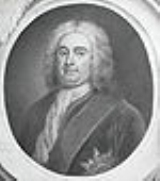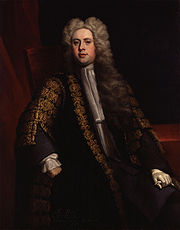
Sir William Wyndham, 3rd Baronet
Encyclopedia

England
England is a country that is part of the United Kingdom. It shares land borders with Scotland to the north and Wales to the west; the Irish Sea is to the north west, the Celtic Sea to the south west, with the North Sea to the east and the English Channel to the south separating it from continental...
politician
Politician
A politician, political leader, or political figure is an individual who is involved in influencing public policy and decision making...
, was the only son of Sir Edward Wyndham
Sir Edward Wyndham, 2nd Baronet
Sir Edward Wyndham, 2nd Baronet , English politician, was Member of Parliament for Ilchester from 1685 to 1687, from 1689 to 1690, and from 1690 to 1695....
, Bart., a grandson of Sir William Wyndham
Sir William Wyndham, 1st Baronet
Sir William Wyndham, 1st Baronet , English politician, was Member of Parliament for Somerset 1656-1658 and for Taunton 1659 and 1660-1679.He was made a Baronet in 1661, of Orchard, Somerset.- References :*...
(died 1683) and a great-great-grandson of Sir John Wyndham of Orchard Wyndham
Orchard Wyndham
Orchard Wyndham is a historic house parts of which date from medieval times near Williton, Somerset, England.There is evidence of occupation of the site from Roman and Saxon times....
, Somerset
Somerset
The ceremonial and non-metropolitan county of Somerset in South West England borders Bristol and Gloucestershire to the north, Wiltshire to the east, Dorset to the south-east, and Devon to the south-west. It is partly bounded to the north and west by the Bristol Channel and the estuary of the...
, who was created a baronet in 1661.
Educated at Eton
Eton College
Eton College, often referred to simply as Eton, is a British independent school for boys aged 13 to 18. It was founded in 1440 by King Henry VI as "The King's College of Our Lady of Eton besides Wyndsor"....
and at Christ Church, Oxford
Christ Church, Oxford
Christ Church or house of Christ, and thus sometimes known as The House), is one of the largest constituent colleges of the University of Oxford in England...
, he entered parliament in 1710 and became Secretary at War
Secretary at War
The Secretary at War was a political position in the English and later British government, with some responsibility over the administration and organization of the Army, but not over military policy. The Secretary at War ran the War Office. It was occasionally a cabinet level position, although...
in the Tory
Tory
Toryism is a traditionalist and conservative political philosophy which grew out of the Cavalier faction in the Wars of the Three Kingdoms. It is a prominent ideology in the politics of the United Kingdom, but also features in parts of The Commonwealth, particularly in Canada...
ministry in 1712 and Chancellor of the Exchequer
Chancellor of the Exchequer
The Chancellor of the Exchequer is the title held by the British Cabinet minister who is responsible for all economic and financial matters. Often simply called the Chancellor, the office-holder controls HM Treasury and plays a role akin to the posts of Minister of Finance or Secretary of the...
in 1713. He was closely associated with Lord Bolingbroke
Henry St John, 1st Viscount Bolingbroke
Henry St John, 1st Viscount Bolingbroke was an English politician, government official and political philosopher. He was a leader of the Tories, and supported the Church of England politically despite his atheism. In 1715 he supported the Jacobite rebellion of 1715 which sought to overthrow the...
, and he was privy to the attempts made to bring about a Jacobite
Jacobitism
Jacobitism was the political movement in Britain dedicated to the restoration of the Stuart kings to the thrones of England, Scotland, later the Kingdom of Great Britain, and the Kingdom of Ireland...
restoration on the death of Queen Anne
Anne of Great Britain
Anne ascended the thrones of England, Scotland and Ireland on 8 March 1702. On 1 May 1707, under the Act of Union, two of her realms, England and Scotland, were united as a single sovereign state, the Kingdom of Great Britain.Anne's Catholic father, James II and VII, was deposed during the...
; when these failed he was dismissed from office.
In 1715, the failure of a Jacobite movement led to his imprisonment, but he was soon set at liberty. Under George I
George I of Great Britain
George I was King of Great Britain and Ireland from 1 August 1714 until his death, and ruler of the Duchy and Electorate of Brunswick-Lüneburg in the Holy Roman Empire from 1698....
and the early years of George II
George II of Great Britain
George II was King of Great Britain and Ireland, Duke of Brunswick-Lüneburg and Archtreasurer and Prince-elector of the Holy Roman Empire from 11 June 1727 until his death.George was the last British monarch born outside Great Britain. He was born and brought up in Northern Germany...
Wyndham was the leader of the Tory opposition in the House of Commons
British House of Commons
The House of Commons is the lower house of the Parliament of the United Kingdom, which also comprises the Sovereign and the House of Lords . Both Commons and Lords meet in the Palace of Westminster. The Commons is a democratically elected body, consisting of 650 members , who are known as Members...
, fighting for his High Church
High church
The term "High Church" refers to beliefs and practices of ecclesiology, liturgy and theology, generally with an emphasis on formality, and resistance to "modernization." Although used in connection with various Christian traditions, the term has traditionally been principally associated with the...
and Tory principles against Sir Robert Walpole
Robert Walpole
Robert Walpole, 1st Earl of Orford, KG, KB, PC , known before 1742 as Sir Robert Walpole, was a British statesman who is generally regarded as having been the first Prime Minister of Great Britain....
. He was in constant communication with the exiled Bolingbroke, and after 1723 the two were actively associated in abortive plans for the overthrow of Walpole.
Despite these various enmities, Wyndham was a respected participant of public life in London. He is, for instance, listed as a founding governor of the Foundling Hospital
Foundling Hospital
The Foundling Hospital in London, England was founded in 1741 by the philanthropic sea captain Thomas Coram. It was a children's home established for the "education and maintenance of exposed and deserted young children." The word "hospital" was used in a more general sense than it is today, simply...
in that charity's royal charter
Royal Charter
A royal charter is a formal document issued by a monarch as letters patent, granting a right or power to an individual or a body corporate. They were, and are still, used to establish significant organizations such as cities or universities. Charters should be distinguished from warrants and...
, granted in 1739. This institution was the capital's most fashionable charity at the time, and Wyndham is listed as a governor alongside such other notables as the Duke of Newcastle-upon-Tyne
Thomas Pelham-Holles, 1st Duke of Newcastle-upon-Tyne
Thomas Pelham-Holles, 1st Duke of Newcastle-upon-Tyne and 1st Duke of Newcastle-under-Lyne, KG, PC was a British Whig statesman, whose official life extended throughout the Whig supremacy of the 18th century. He is commonly known as the Duke of Newcastle.A protégé of Sir Robert Walpole, he served...
, the Earl Waldegrave
James Waldegrave, 1st Earl Waldegrave
James Waldegrave, 1st Earl Waldegrave KG PC was a British ambassador.Waldegrave was the son of the 1st Baron Waldegrave and Henrietta FitzJames, the illegitimate daughter of James II and Arabella Churchill....
, the Earl of Wilmington
Spencer Compton, 1st Earl of Wilmington
Spencer Compton, 1st Earl of Wilmington KG, KB, PC was a British Whig statesman who served continuously in government from 1715 until his death. He served as the nominal head of government from 1742 until his death in 1743, but was merely a figurehead for the true leader of the government, Lord...
, Henry Pelham
Henry Pelham
Henry Pelham was a British Whig statesman, who served as Prime Minister of Great Britain from 27 August 1743 until his death in 1754...
, Arthur Onslow
Arthur Onslow
Arthur Onslow was an English politician. He set a record for length of service when repeatedly elected to serve as Speaker of the House of Commons, where he was known for his integrity.-Early life and education:...
and even Horatio
Horatio Walpole, 1st Baron Walpole of Wolterton
Horatio Walpole, 1st Baron Walpole, PC , English diplomatist, was a son of Robert Walpole of Houghton, Norfolk, and a younger brother of the Prime Minister of Great Britain Sir Robert Walpole....
and Sir Robert Walpole
Robert Walpole
Robert Walpole, 1st Earl of Orford, KG, KB, PC , known before 1742 as Sir Robert Walpole, was a British statesman who is generally regarded as having been the first Prime Minister of Great Britain....
.
He died at Wells on 17 June 1740. Wyndham's first wife was Catherine, daughter of Charles Seymour, 6th Duke of Somerset
Charles Seymour, 6th Duke of Somerset
Charles Seymour, 6th Duke of Somerset , sometimes referred to as the "Proud Duke". The son of Charles Seymour, 2nd Baron Seymour of Trowbridge, and Elizabeth Alington , he succeeded his brother Francis Seymour, 5th Duke of Somerset, to the dukedom when the latter was shot in 1678...
. By her he had two sons, Charles, who succeeded to the baronetcy on his father's death in 1740 and became 2nd Earl of Egremont
Charles Wyndham, 2nd Earl of Egremont
Charles Wyndham, 2nd Earl of Egremont, PC and Catherine née Seymour, succeeded his uncle, Algernon Seymour, 7th Duke of Somerset, as 2nd Earl of Egremont in 1750...
in 1750, and Percy who was created Percy Wyndham-O'Brien, 1st Earl of Thomond
Percy Wyndham-O'Brien, 1st Earl of Thomond
Percy Wyndham-O'Brien, 1st Earl of Thomond was a British Member of Parliament, Irish peer and the younger son of Tory statesman Sir William Wyndham and brother to Sir Charles Wyndham, 2nd Earl of Egremont....
in 1756. He also had three daughters, one of whom, Elizabeth, married British Prime Minister George Grenville
George Grenville
George Grenville was a British Whig statesman who rose to the position of Prime Minister of Great Britain. Grenville was born into an influential political family and first entered Parliament in 1741 as an MP for Buckingham...
, and was the mother of the later British Prime Minister William Wyndham Grenville. Sir William's second wife was Maria Catherina de Jonge, widow of the Marquess of Blandford
William Godolphin, Marquess of Blandford
William Godolphin, Marquess of Blandford was an English nobleman.He was born the eldest son of The Hon. Francis Godolphin and his wife Lady Henrietta Godolphin, née Churchill...
.

